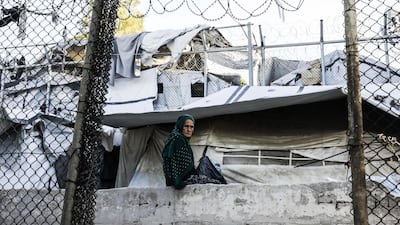Following the deaths of a mother and a child in Moria refugee camp in Greece, the country’s government has been left scrambling to respond to the country’s migrant crisis.
Greek prime minister Kyriakos Mitsotakis’s conservative government held a special cabinet meeting on Monday to address the crisis caused by a massive influx of refugees and migrants to the country’s southern islands since July.
After weeks of warnings from NGOs and charities that refugee camps in the Aegean were past breaking point — Moria itself currently holds 13,000 migrants, more than four times its 3,000-person capacity — tensions have boiled over following the deaths.
Police fired teargas into the camp to disperse riots that started in response to the deaths. The deadly blaze had spread to containers where refugees and migrants had been housed in the overcrowded camp. Unrest lasted until the early hours of the morning.
As the rioting continued, Greece’s interior minister George Gerapetritis said in a television interview the government would be discussing a draft law to update Greece’s current asylum procedure. Leaks to the Greek press have indicated that under consideration are measures that would transport thousands of migrants to the Greek mainland from the overcrowded camps.
Greek opposition leader and former prime minster Alexis Tsipras addressed the deaths and subsequent riots at a youth festival saying his party would defend human rights.
“Regardless of their background, colour and religion, they are all human beings and above all we defend human life, human rights,” Mr Tsipras said according to the Greek news outlet Stonisi.
While Moria has become the flashpoint for recent tensions, it is only one of a number of camps in the Greek islands overburdened with migrants and refugees. The islands of Lesbos, Chios, Samos, Leros and Kos are each at least double capacity. Greece is hosting 70,000 mostly Syrian refugees and migrants who have fled their countries since 2015, and crossed over from neighbouring Turkey.
Reem Mussa, humanitarian affairs advisor from MSF in Brussels, told The National that the EU’s 2016 agreement with Turkey to limit departures towards the five Greek islands closest to its shores lay at the heart of the crisis.
“When this policy was introduced in 2015 there was a rhetoric that said 'this is an exceptional and temporary measure to allow Europe to gain control of the situation',” she said.
“It has become a political game where people's lives are trapped in the middle, rather than one of pragmatic solutions where we respect the wellbeing of people trapped in the centre of all this, she added.
Christine Nikolaidou, a spokeswoman for the UN’s International Organization for Migration (IOM), explained that extreme pressure on migrant facilities in the Aegean had been caused by increased arrivals particularly from Afghanistan and Syria.
“Inevitably we are dealing with this significant increase from people who are coming from Turkey,” she explained.
Between January and May on average around 3,000 migrants arrived to the Greek islands from Turkey each month, the IOM has said. During the summer months this figure increased considerably to 5,500 in July, 8,300 in August and 8,000 arriving in September.

